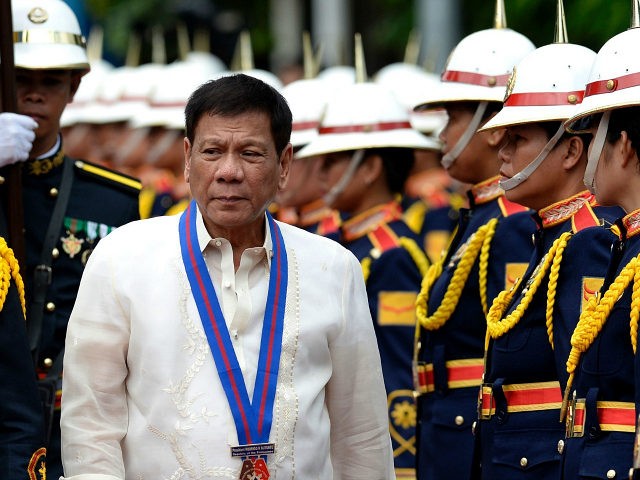Philippine President Rodrigo Duterte on Monday threatened to imprison people who refuse to receive a Chinese coronavirus vaccine, the Philippine Star reported.
“If you don’t want to be vaccinated, I will have you arrested,” Duterte said during a nationally televised address on June 21.
“But if you don’t want to, I will have you arrested. That is in pursuance of a policy of our crisis of this health issue,” he reiterated.
“Go to India if you want or somewhere, to America. But for as long as you are here and you are a human being, and can carry the virus, get vaccinated,” the president added in a mix of English and Filipino.
“Duterte continued that if people will refuse to receive COVID-19 [Chinese coronavirus] jabs, he will direct barangay captains [district officials] to record a tally of them and even threatened that they will have them inoculated with Ivermectin, the anti-parasitic drug for animals that some are claiming can prevent COVID-19 [Chinese coronavirus],” according to the Philippine Star.
“Choose: Get vaccinated or I will have you jailed? I am telling you, police detention cells are not clean, police are lazy to clean. Everything is there — every filth is there. You will stay there,” Duterte said.
Philippine Secretary of Justice Menardo Guevarra issued a statement June 22 clarifying that no law currently exists in the Philippines compelling people to receive a Chinese coronavirus vaccination.
“As a lawyer, he (Duterte) knows that not getting vaccinated is a legal choice; there is no law as yet that compels vaccination against COVID-19 [Chinese coronavirus], much less criminalizes it, as presently available vaccines are still in their trial phases,” Guevarra’s statement read.
“I believe that the President merely used strong words to drive home the need for us to get vaccinated and reach herd immunity as soon as possible,” the justice secretary added.
Duterte’s speech on Monday followed “reports of low turnouts at several vaccination sites in the capital, Manila,” according to Reuters.
Philippine health officials said that, as of June 20, 2.1 million people in the Philippines were fully vaccinated against the Chinese coronavirus. The figure indicates the Philippine federal government has so far made slow progress toward its stated goal of vaccinating up to 70 million of the Philippines’ 110 million people by the end of 2021.
“Malacañang [the office of the Philippine presidency] said the government is administering about 322,000 doses a day and is targeting sufficient supply to achieve 500,000 daily doses. About 11 million doses are expected to arrive in the Philippines this month alone,” CNN Philippines reported on June 22.
Various international governments — including those of China, Russia, and the United States — have donated or sold Chinese coronavirus vaccines and vaccine candidates to the Philippines for use in the country’s official state-run coronavirus vaccine drive.
“[T]he Philippines has secured the delivery of 113 million doses from five vaccine manufacturers — also including China’s Sinovac with 26 million doses, Russia’s Sputnik V with 10 million doses, 20 million doses from [the U.S.-based] Moderna and 17 million doses from AstraZeneca,” Reuters reported June 20.
The Philippine government began its rollout of China’s state-made Sinovac starting March 1 and started administering AstraZeneca vaccines March 9. AstraZeneca is a British-Swedish multinational pharmaceutical company that developed its coronavirus vaccine together with Oxford University.
The Philippine government signed an agreement with the U.S.-based multinational pharmaceutical company Pfizer and the German biotech company BioNTech on June 20 to secure 40 million doses of their jointly developed Chinese coronavirus vaccine, with the first batches of the order expected to arrive in August. The Philippine government began administering a select number of Pfizer-BioNTech vaccine doses to the Philippine public on May 12. Similarly, five cities across Metro Manila started offering doses of Russia’s Sputnik V in early May.
Late-stage clinical data for Sinovac released in January showed it was just 50.38 percent effective against the Chinese coronavirus. The Russian state-made “Sputnik V” coronavirus vaccine candidate has yet to receive approval from the European Union’s health regulator for distribution across member states.

COMMENTS
Please let us know if you're having issues with commenting.